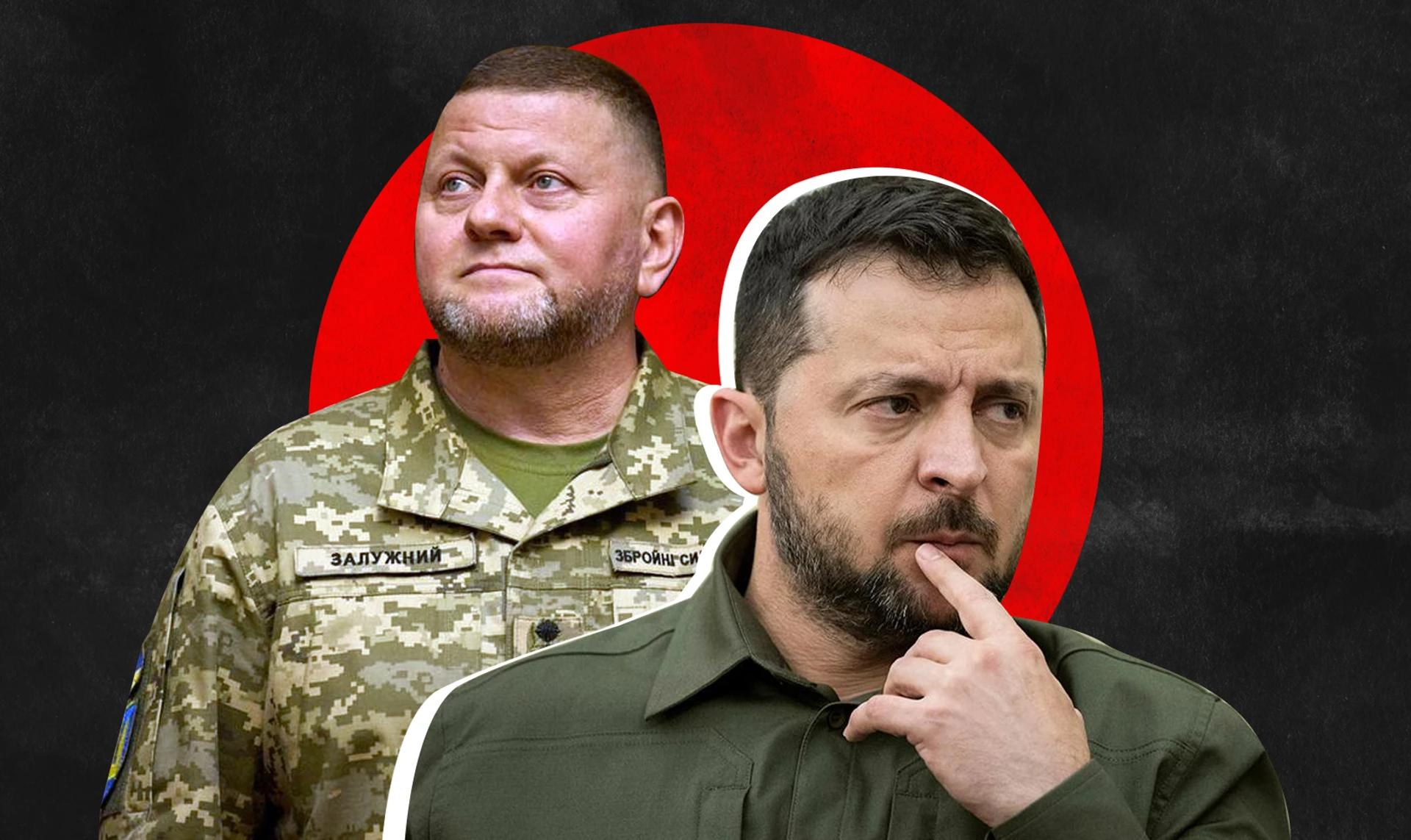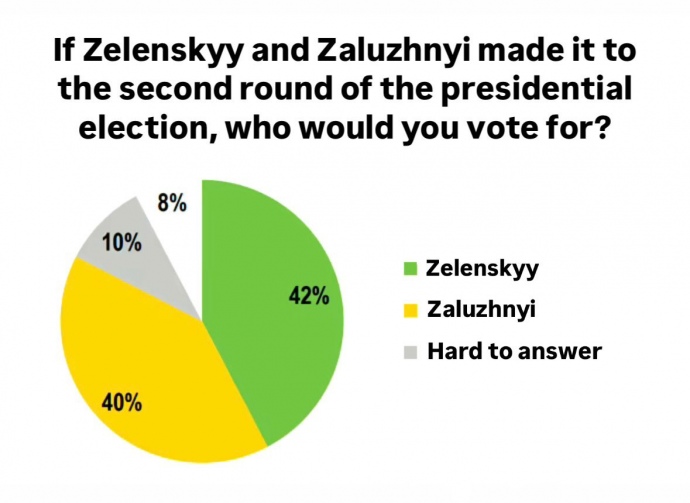War vs politics: what's really going on between Zelenskyy and Zaluzhnyi?

On 20 November, an eminent American guest was welcomed on the platform of Kyiv Central railway station. US Defense Secretary Lloyd Austin arrived in Ukraine on an unannounced visit on the eve of the anniversary of the Revolution of Dignity.
His visit was not supposed to be anything out of the ordinary, just a tribute to Ukrainian heroes and a statement of Washington's ongoing support for Ukraine. But Ukrainska Pravda has discovered that this visit inadvertently became an additional catalyst for tension between the military and political leadership in Kyiv.
One Staff member described the atmosphere to Ukrainska Pravda: "There is an impression that after Austin's visit, Zelenskyy came closer to deciding to replace Zaluzhnyi. On the contrary, the bickering vanished and jokes appeared at Staff meetings, but it was a very cold, sharp kind of humour. The president would say things like ‘What, we're making a heroic advance, we've retreated 200 metres?’ and there’d be a stony silence from Valerii [Zaluzhnyi]."
In recent weeks, the world's media has been relishing the details of the "conflict" between the Ukrainian President and the Commander-in-Chief of the Armed Forces in various ways. Zelenskyy’s Office at Bankova Street, though, has been quick to label all such claims as "Russian psyops" and "the Kremlin’s work".
On the whole, it’s not surprising that there should be disputes between the two top officials when there’s a war on. This happens in every war. On the contrary, it would be surprising if there were no arguments between such ambitious people, who are literally making history.
But given the enormity of the threat that Ukraine is facing, it is vital to understand exactly what is really going on between the President and the Commander-in-Chief, and how much is just speculation by various ignorant MPs.
Where does the tension come from?
The first signs of the future political battles were visible in the centre of Kyiv even before Russian troops withdrew from the Ukrainian capital last spring.
In early March 2022, sociologists began to wonder how the full-scale war had affected Ukrainians' confidence in state institutions. Research showed that 93% of the population trusted President Zelenskyy at that time.
That would seem to be a great result, showing that Zelenskyy, the Supreme Commander-in-Chief, has the trust of the vast majority of citizens in the most difficult of times.
However, the President’s Office was more focused on another of the survey’s findings: 98% of Ukrainians – 5% more – had confidence in the Armed Forces of Ukraine in March 2022.
As Ukrainska Pravda wrote at the time, Zelenskyy's inner circle was worried about who personified the army. And it wasn’t Zelenskyy. It was Valerii Zaluzhnyi, Commander-in-Chief of the Armed Forces.
At the same time, the cause of the dispute between the President’s Office and the Commander-in-Chief started in April 2022, when Zaluzhnyi set up a charity (We Will Win) that the Office suspected might eventually develop into a political party.
The first person to be concerned about Zaluzhnyi's possible ambitions last spring was Andrii Yermak, Head of the President’s Office. While staying with the president in the shelter known as Facility No. 1, Yermak kept drawing the attention of Zelenskyy's entire entourage to the Commander-in-Chief.
"No one had thought about it at all at that point, and Andrii was always bringing up something about Valerii every day, whether it was his charity, or his popularity with the media, or the fact that he only had supporters of [former president Petro] Poroshenko around him, or something else. It looked strange, but it wasn’t that important at the time," a member of the government team who had access to Facility No. 1 recollected in a conversation with Ukrainska Pravda.
After some unpleasant flare-ups with the political leadership, Zaluzhnyi has deliberately avoided the Ukrainian media spotlight. His public activity has so far been limited to writing social media posts and giving a few interviews over the past two years about the war, all to foreign media outlets.
However, this has done nothing to calm the Office's fears that the Commander-in-Chief might become a political competitor. The fact is that Zaluzhnyi's absence from the public eye had an effect similar to that shown in the TV series The Young Pope: since the Commander-in-Chief was hardly ever in the media, anything he said or did instantly became an event and provoked a phenomenal reaction from the public.
The tensions between politicians and the military were not critical as long as Ukraine’s Armed Forces were achieving significant successes in Kyiv, Kharkiv and Kherson oblasts, the preparations for the counteroffensive were underway, and the Ukrainian resistance was delivering a string of victories.
But when the Ukrainian offensive in the south stalled, the disagreements between the two leading figures in the war began to poison the atmosphere between them to the point that it became public.
A military-political game: the nature of the tension between "Ze" and "Za"
If we strip away the political and emotional layer that Zelenskyy and Zaluzhnyi’s relationship has recently acquired, the nature of the tension between them arises from the mixing of war and politics.
Zelenskyy brought elements of politics into the leadership of the army, which is Zaluzhnyi's area of responsibility. In return, Zaluzhnyi has involuntarily become a significant phenomenon in politics, i.e. the area of the president's vital interests.
Before Russia’s full-scale invasion and at the very start of it, Zelenskyy, while formally the Supreme Commander-in-Chief, paid much less attention to military issues than, for instance, road building or going after oligarchs.
However, during the two years of the full-scale war, the president began to use his status as Supreme Commander-in-Chief not only formally: he started to actually get involved in military planning and command. This was objectively necessitated by the circumstances.
When Zelenskyy began to engage with the war, he did not stop being a politician, and he brought uncharacteristic forms of behaviour to the rigidly hierarchical structure of the Armed Forces.
Zelenskyy effectively created parallel lines of communication with the commanders of various branches of the Armed Forces, bypassing Zaluzhnyi – such as with Oleksandr Syrskyi, Commander of the Ground Forces, and Mykola Oleshchuk, Commander of the Air Force.
Direct contact with commanders obviously speeds up the president’s work, but it destabilises the work of the Commander-in-Chief, who learns some information from people who are officially his subordinates only at Staff meetings, if at all.
"You see, sometimes it seems that Zelenskyy has two types of Armed Forces: the ‘good’ ones commanded by Syrskyi and other favoured ones, and the ‘bad’ ones which are subordinate to Zaluzhnyi. This is very demotivating for the Commander-in-Chief and, most importantly, it prevents him from commanding the entire army." That’s how one person close to Zaluzhnyi described the problem in a conversation with Ukrainska Pravda.
Another example of Zelenskyy behaving like a politician was the high-profile media story about a purge of regional military enlistment officers. Following an investigation by Ukrainska Pravda into the unprecedented wealth amassed by the Odesa Oblast military enlistment chief during the war, the president demanded the dismissal of all the heads of oblast enlistment offices and an investigation into their assets.
"[Oleksii] Sukhachov, Head of the State Bureau of Investigation, came to a meeting of the Staff in the summer and began to report on how good it was that the military enlistment chiefs had been dismissed. Then it was Zaluzhnyi’s turn to speak, and he just made this exquisite comment: ‘I want to thank law enforcement; corruption is an important topic. But I also want to announce the latest mobilisation data.’ And there was a sharp drop in all oblasts," one person who attended that meeting said on condition of anonymity.
In other words, what looked like a swift and decisive response to society's demand for justice from a political point of view actually had complex consequences from a military point of view.
Personnel changes such as the dismissals of Viktor Khorenko, Commander of the Special Operations Forces, and Tetiana Ostashchenko, Commander of the Medical Forces, and the potential resignation of Serhii Naiev, Commander of the Joint Forces, have had a similar effect.
All of these officers are from Zaluzhnyi’s inner circle, and their dismissal creates instability in the command hierarchy. The criminal case against Naiev for the defence of the south, which Zaluzhnyi sees as an attempt to get close to him, is another chapter in the same story.
But the tension between the President and the Commander-in-Chief really spiked after the start of the counteroffensive in the south.
The President’s Office has rational grounds for complaint, as it was the military that submitted the plan for the offensive and calculated the assets and personnel that would be needed. It was on the basis of these calculations that the political leadership sought assistance from Ukraine’s partners and recruited new units.
However, the actual fighting turned out to be much more difficult than planned, and the achievements of the Melitopol offensive deviated considerably from the plan.
Obviously there were insurmountable military reasons for this: the Russians had had enough time to build an extensive defence network, and the Ukrainian Armed Forces had a significant shortage of resources for such an operation in such conditions. They did not receive all the supplies they’d been promised and faced total Russian air superiority.
The problem was that the "great counteroffensive" had a political as well as a military dimension.
Using the national 24/7 newscast, their media resource network, and information campaigns by "branded" units of the Offensive Guard and other units, the same people from the President’s Office who had previously turned the blood-soaked defence of "Fortress Bakhmut" into a brand (!) now raised public expectations to such heights that ordinary people expected the liberation of Crimea at the very least. And so did Ukraine's Western partners.
Without this political spin, the purely military problems of the fighting in the south would have been much easier to perceive, understand and communicate, and those responsible would have been easier to identify.
But now, if attempts are made to pin responsibility for the stalling in the south on Zaluzhnyi, who was directly responsible for planning and preparing the counteroffensive, the President’s Office will have media-related problems as well as military ones.
Because just as Zelenskyy has penetrated Zaluzhnyi's military domain, Zaluzhnyi, without actually doing anything, has encroached upon Zelenskyy's political area.
Zaluzhnyi does not make political statements and does not have a party or even a public movement or foundation. However, the President’s Office regularly commissions sociological surveys, and Zaluzhnyi's metrics are steadily rising.
Presidential political ratings in a recent Telegram communication from the President’s Office indicated that in the first round, Zelenskyy garnered approximately 47% of the votes among those who had made up their minds.
Ukrainska Pravda was granted access to a comprehensive unpublished dataset from a study conducted by the Rating Group. The main graphic is focused not on the president advancing to the second round against General Zaluzhnyi, but rather on the prospect that Zelenskyy may not secure victory in this subsequent round.
Apart from Zaluzhnyi, Zelenskyy has no other competitors. So when the president warned military men against going into politics in an interview with The Sun, his words were primarily aimed at Zaluzhnyi.

Has Zaluzhnyi done anything politically to make the electoral situation this way? Absolutely not! He does not exist as a political actor in the media at all.
Rather, his potential rating is a consequence of something we have long known: the fact that Ukraine is not Russia. Even in the midst of a major war, Ukrainian society is striving for a political balance of power, and Ukrainian democracy is demonstrating yet another example of its resilience.
Could Zaluzhnyi be dismissed?
Ukraine desperately needs new supplies of weapons and ammunition before the new year. These had to be agreed on with our partners in advance, and it was also important to plan the production of our own weapons in advance.
In other words, the needs of the Armed Forces had to be known in advance. This means that the General Staff has to present its strategic plan to the political leadership, and the military has to be able to identify what it needs for that plan to be implemented.
Obviously, the idea and the plan of operations don’t need to be published in the Voice of Ukraine [the official newspaper of the Verkhovna Rada (Parliament)], but they do have to be seen by the president, the Defence Ministry, the Verkhovna Rada, which allocates the budget, and the manufacturers who have to procure components.
"We on the committee have been waiting so long for a war plan. The General Staff needs to draw up a plan: this is how I want to fight next year, I need x amount of people, I need x amount of money. And no one has a plan," Davyd Arakhamiia, leader of the Servant of the People faction, said indignantly in a recent interview.
Arakhamiia's complaint was backed up by another Servant of the People MP, who agreed that the military leadership should step down.
In the latest episode of UP.Chat, however, Serhii Rakhmanin MP, who sits on the National Security, Defence and Intelligence Committee, denied that any strategic planning documents should be submitted to the parliamentary committee. After all, that is not within its competence.
In fact, the problem is not that there is no plan. The problem is that neither the political leadership nor Ukraine’s Western partners are satisfied with the real plan to return to 1991 borders.
According to Ukrainska Pravda, the General Staff’s calculations show that achieving the president’s objective of liberating the entire territory of Ukraine will require US$350-400 billion worth of assets and personnel.
The General Staff shared some planning ideas with Pentagon chief Lloyd Austin during his visit to Kyiv in November.
"Austin was told 17 million rounds of ammunition were needed. He was stunned, to put it mildly, because you wouldn’t be able to collect that many rounds in the whole world," a senior Defence Forces official told Ukrainska Pravda off the record.
Pentagon representatives were even more surprised by their Ukrainian counterparts’ candour about the internal situation in the country.
"Austin then told us Zaluzhnyi had complained about how everyone obstructed him – the President’s Office, this person, that person. Well, obviously the president learned about those conversations too. And that isn’t conducive to trust," the source added.
Knowing Zelenskyy's emotional nature, we may speculate that Zaluzhnyi's excessive frankness in his conversations with Ukraine’s partners could be enough to move his dismissal from being a purely hypothetical issue to a practical one.
This raises the question of who would be brave enough to replace the commander-in-chief in his position. So far, of the obvious options available to Zelenskyy, the only candidate is Colonel General Oleksandr Syrskyi, Commander of the Ground Forces of the Armed Forces of Ukraine.
But although he is associated with successful operations such as the defence of Kyiv, the Battle of Kharkiv, and the counteroffensive in Kharkiv Oblast, there are two main problems with Syrskyi.
The first is that he needs to generate real media interest, no matter how often Zelenskyy personally visits his positions and how many of his posts are reposted by the President’s Office. Second, Syrskyi is unable to shake off the difficult role of an army commander who doesn’t care too much about losses.
But the main problem with this potential appointment seems to be that promoting Syrskyi would do nothing to stop a new Ukrainian political superstar being born in the media, which is what Zaluzhnyi will inevitably become as soon as he leaves his post.
Ukrainska Pravda sources from Zelenskyy’s inner circle say Bankova Street is well aware of this. A significant part of the president’s team is strongly opposed to the dismissal of the current Commander-in-Chief.
* * *
Be that as it may, if anyone can think about replacing Zaluzhnyi, it is the person who appointed him – President Zelenskyy.
Before making such a fateful decision, the president should consider whether that personnel decision would remove the fundamental reason for the recent deterioration in his relationship with the Armed Forces chief.
It all comes down to the future strategy of the war. Zaluzhnyi outlined his view on this issue in his much-talked-about piece for The Economist.
The main idea in his article was a very logical argument: Ukraine does not have the resources for a great victory under current conditions. First, we need to take the system of recruiting, training and equipping our army to a qualitatively new level and get our partners to make a leap forward in their technological support of the Armed Forces.
All these positions, one way or another, require a strategic pause for a proper breakthrough.
But President Zelenskyy does not want to hear about a "stalemate" or a halt in the war. His logic is just as ironclad: a pause will lead to a freeze, a loss of interest from our partners, and a reduction in aid. If we take a break now, we may not be able to get out of it.
Could Zaluzhnyi's departure resolve this strategic dispute? No.
But his departure would be guaranteed to lead to Ukraine losing a key strategic advantage over the aggressor: the loss of unity between the two leaders could turn into a loss of the internal unity of the entire society.
Roman Romaniuk, Roman Kravets, Ukrainska Pravda
Translation: Myroslava Zavadska, Sofiia Kohut
Editing: Teresa Pearce

